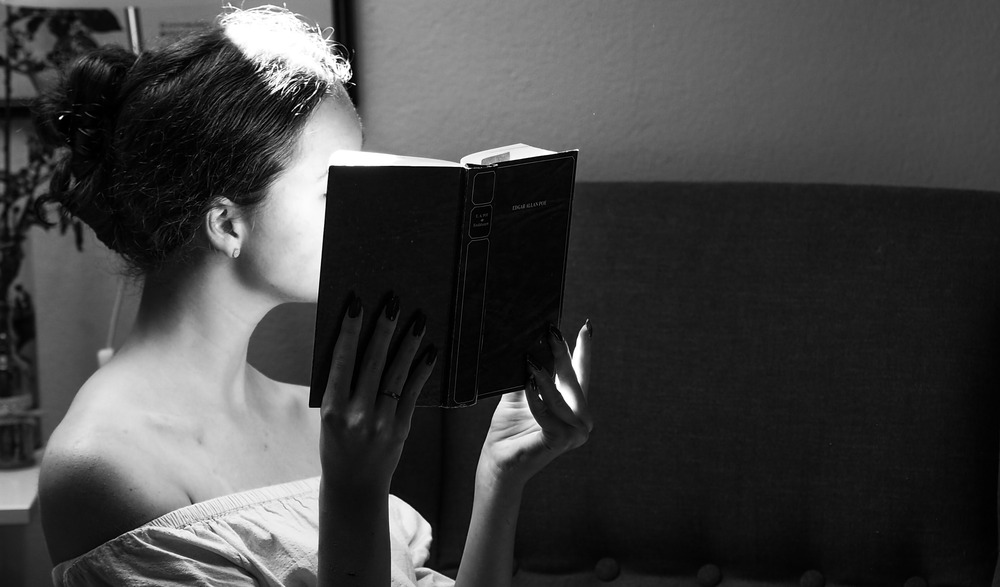interviews
The Quiet Drama of Chaya Bhuvaneswar
The author of “White Dancing Elephants” creates space in her stories for pondering violence, vulnerability, and betrayal

Chaya Bhuvaneswar’s debut collection White Dancing Elephants (winner of the Dzanc Short Story Collection Prize) is not a book you can succinctly describe. Her stories take on rich topics from mythology to assault to history to tenuous relationships. When you turn the page there is never one element tying these pieces together but a wealth showcasing a distinctness in characters, motivations, and language. What struck me most about Bhuvaneswar’s stories was an element of her own fearlessness as author to “go there.” She doesn’t hold back emotional truths, never relies on sensationalized moments for the reader to be entertained, instead we envision, and inhabit, the losses (and the joys) felt by those experiencing them. How will a rape affect a young student over the years? Will cancer be the death of a friendship? How does the loss of a child reveal the tears within a marriage? Where do we gain our strength on an individual level as people, as women? Perhaps the stories in White Dancing Elephants do not always provide readers a clear answer, yet they’re filled with probing questions (and experiences) encouraging us to read on.
Bhuvaneswar is a four-time Pushcart Prize nominee whose work has been published widely on Medium, in Tin House and Michigan Quarterly Review to name a few. She and I had a chance to chat about her approaches, and feelings, on writing novels versus stories, creating “quiet” work that maintains resonance, and the necessity (and her hope) for kindness in life and in our stories.

Jennifer Baker: Can you speak a bit about White Dancing Elephants and recognizing which stories fit within a more compact space?
Chaya Bhuvaneswar: I think the space of a short story is permissive in a way that a project as long as a novel is not. I feel freer to completely experiment and not have any idea where I’m going
JB: I see.
CB: I feel that in general about the novel, but that permissiveness in my case has been an obstacle to finishing/structuring a novel. Whereas with a short story I feel more aware of something else taking over. I think with the first few drafts of a novel I feel that freedom, but then the process of structuring because it’s longer turns the whole endeavor into something so different than story writing whereas my revision process with stories doesn’t involve the same kind of uprooting

JB: So with the novel you don’t feel as free to experiment or due to the shorter nature of the short story there’s an element of “going with the flow” more easily?
CB: When I write a story I feel like it essentially works, and then I just refine, try and try to make things cleaner and clearer. And above all straighten out chronology so it’s clear what happens on the level of a story being “something happens as a result of which something changes.” Or else I feel like a story doesn’t really work, and I can’t yet see why, so i just put it aside. With a novel — because of how deeply I inhabit and dig into that world for hundreds of pages and how invested I feel in characters’ trajectories more or less paralleling my own — there are continuous years. I am more reluctant to put a novel aside once I’ve gotten 200 pages together. So, I think I deliberate more with a novel before killing anyone off, in other words.
JB: There can be a big go-round in either case, but I don’t know if it’s right to say a short story feels “safer” due to space limitations (or perceived limitations). At least it can feel a bit more finite in the road you’re headed to from beginning to end. Or maybe I’m making that up with my editorial mindset.
CB: I guess on a basic level I write so many more stories than novels, it feels like I would be able to move on from writing a story that completely doesn’t work. Versus a novel that completely doesn’t work pretty much devastates me.
JB: Is that because of the time investment or the larger picture of it in terms of “finishing”?
CB: A novel that doesn’t work can feel like a death. Really. Like I failed a person, my characters. I failed her/them. Not myself. If that makes sense. It could be kind of a medical way to think about writing novels. I don’t know, but I do feel that… that I am bound to the characters. They’re so important to me.
A novel that doesn’t work can feel like a death.
JB: But that doesn’t gestate the same way for stories?
CB: Somehow it feels like a story is a moment passing in time, a snapshot, an ephemeral thing, and if I don’t “catch” the person in that story, I could catch them in the next one. Whereas with the novel there are multiple moments, accrued moments, so many opportunities, and I feel like when it isn’t as clear how to capture the whole person within those, it could be that there is some flaw in the story being told, some flaw in larger construction, or some flaw I am just not able to perceive yet.
I love the challenges of both forms, in other words, but somehow novels and stories work on our emotions a little differently, I think, or maybe I just read too many essays by Kundera and Havel and other Europeans about the novel and subjectivity growing up.
JB: I think, sometimes, folks seek to find a “theme” in story collections, sort of like in an anthology. “What connects all these pieces?” I don’t want to pigeonhole. But I think for White Dancing Elephants it’s the necessity of who gets to tell their own stories as narrators/protagonists.
CB: To me the theme that resounded through all of them was one of experiencing violence and then somehow enduring it and making your way in the world “after.” I loved that the Kirkus reviewer pinpointed “aftermath” as a common theme of the stories. Living in the aftermath of some decision or event.
‘Friday Black’ Is a Brutal, Brilliant Satire of American Racism and Capitalism
JB: That is true. Stories like “Orange Popsicles” or “Talinda” (which stood out to me in particular), contain the essence of not knowing what’s next for anyone really, but in particular for these characters because so much was left open from what’s happened to them and/or choices they made.
CB: I find that a resonant quality of stories that I love. I’m thinking in particular of Alice Munro’s “Runaway.” Or Lauren Groff’s Atlantic story, “L. Debard and Aliette.” We don’t know what happens to that “kindly” woman neighbor hoodwinked by her beliefs about vulnerability, female loyalty, freedom. We don’t know what happens to Aliette per se. Will she be energized when she wakes up after those hours in bed with the hot water bottle? Will she be dreaming of him? Will she write to him about his poetry, and say that she was there? We don’t know, but in a living way. In the sense when we see any credible, living, fully-fleshed human character in a story, we don’t know what the person is going to do next. Just like in real life: We don’t know what any given individual will do next.
JB: While not wanting to discuss the ending of a story like “Talinda” there’s a certain level of resonance I appreciated that spoke to the dynamics of friendship. I think to some it may appear as a story of “betrayal,” but to me it really speaks to the importance and bond these two women had. And it strikes me from beginning to end how much they relied on one another. I’d love to know how you envisioned this balance of representing women of color in a way that is a tug-of-war. It’s not wholly good or bad, it’s complicated as friendships are.
CB: I think the first model for me of complicated female friendships was actually from watching my mother with her five sisters.
JB: Oh really?
CB: Incredible rivalries, alliances, “fights,” disagreements, some quite brutal. Always a lot of tears and laughter and high expressed emotion and shouting, super expressive. In comparison, not having sisters, but definitely having incredible female friendships and frenemy-ships starting from a young age, particularly with other girls of color, there was so much I felt and so much they felt that we rarely expressed. We were so contained by comparison. Even the Americans I saw with each other were mostly so contained. And not just when they knew I was watching. I say “Americans” by the way as such a sad reflex. I mean “white Americans.” Long years of inculcation (sigh).
So when I started writing about my own female friendships, dating back to a Chinese-American girl who bullied me and a Korean-American classmate so terribly, so mercilessly, that I wrote several stories about it. Then examining my friendship with that Korean-American friend, I started uncovering the emotions we didn’t express directly and becoming quite fascinated with those, with what you point to as the kind of substrate of meaning and closeness (and longing) that the two female characters have in “Talinda.”
‘And It Begins Like This’ Explores the Generational Trauma of the Black Community
JB: There’s definitely something, I don’t know if unresolved is the best word or even unrequited, as it is unspoken. And that impacted me as a reader quite specifically of these two faces staring across the table at one another as one receives horrible news: the stoicness of one and the other reflecting that pain at her during dinner. Quite powerful.
CB: I’m also interested in “constructed” families. Familial bonds that can be substitutes. It counts, I guess, that both female characters don’t have fathers present in their lives.
JB: Someone has to be the strong one right?
CB: One thing I loved about writing this collection was being free to conceive of strength in all kinds of ways too!
JB: Beyond the husband in that story, of course, men seemed a bit inconsequential.
CB: I am grateful that some of the reviews [of White Dancing Elephants] were written by men, and they were so encouraging and felt the stories resonated with them. I think when we write from a fierce self-focused subjectivity, “not caring” what others think, it paradoxically can resonate so much with people completely different from us. In my case, with cis-het men.
At several readings, when I’ve done store walk-arounds right before the event, just checking to see if anyone browsing or drinking a coffee alone would like to come and be part of the event, it’s nearly always been white male readers who come along and stay and say amazing things afterward. They initially come saying something like “Oh yeah, I wanted to pick up something for my daughter/ wife/ etc.” And then end up coming to the signing line and talking about how they were into the stories. The drama.
I think when we write from a fierce self-focused subjectivity, “not caring” what others think, it paradoxically can resonate so much with people completely different from us.
JB: Meaning the drama of the stories?
CB: Yes, the “dramas” represented by the stories!
JB: I don’t think so much of them in the realm of “dramatics” so much as exploration with life thrown in. Not to say that life isn’t dramatic.
CB: I’m glad you don’t necessarily think of “drama” when you read the stories. Ideally, the drama is quiet, the pain visceral.
JB: That is exactly my thinking in terms of “quiet.” Obviously some stories are quite specific due to the level of brutality characters deal with but it doesn’t read as orchestrated at all. And it seems like with Jamel [Brinkley] for Black men, you aimed to look after the Brown women in your stories, yet also not shy away from a truth experienced by women of color.
CB: Yes! I definitely feel there’s an inherent beauty simply in truth telling. But also it would never occur to me to victimize or objectify my characters of color the way that some stories have done. That really shock me. Not as much in fiction, but in film. I’m still wrestling, for example, with The Bandit Queen. It’s a movie about a rape survivor turned bandit herself turned politician and writer. But there is such a strong historic legacy of sensationalizing rape in Indian cinema (really in world cinema) that I had very conflicted feelings about it. I hoped in “Orange Popsicles” by focusing so much on the woman’s experience, on my character’s experience, to avoid that. Avoid making it anything. Just tell it. Just show it as is. Just let the showing tell.
JB: Well, it’s a different case than with the film Foxy Brown where her rape is an instrument of white power and fighting establishment. There’s a brutality in the not “dealing” with the rape but in the performance or butchering of the rapist. It’s wrong and people should be punished, but I keep coming back to Lacy M. Johnson’s The Reckonings of: How do healing and justice truly occur? And how do we talk about this, especially through art?
CB: I’m full of joy and hope that these conversations are even happening. That we are not only creating spaces for people to come forward with their stories and not be shamed or pressured into telling them any specific way. But also we are creating space where we can examine “how we talk about” healing and justice without the fear that if we linger too long in any kind of examination, people will be forced back into silence again. The silence is never coming back. We’re never going back to that. Period.
We are creating space where we can examine “how we talk about” healing and justice without the fear that if we linger too long in any kind of examination, people will be forced back into silence again.
JB: Let’s hope so. Via your interview in Hobart I appreciate that they asked about ableism. You were happy to be able to discuss this as well in relation to your stories. Particularly in relation to the abled lens but also via the disabled lens as well.
CB: It’s such an important dimension.
JB: Being an able-bodied person myself I did come away from pieces seeing the brutality about to be thrust upon someone and thinking “Hmmm, are we seeing our composites here in the reaction to the person in this story?”
CB: It’s important to me to delve into the multidimensionality of “perpetrators” of violence. And I think the genuine fear we all have as human beings, of illness, of the mortality, factors into how cruel people can be to those they perceive as “disabled” rather than differently-abled.
That said, in a larger sense, I believe that the potential for cruelty exists in such a diverse array of human beings. It’s a miracle to me that people can for much of the time actually be very kind to me. And even more of a miracle at how much kindness I personally have experienced from others, from people I know as well as strangers. I feel like kindness should be more automatic than it is. Perhaps it’s something I take for granted.









